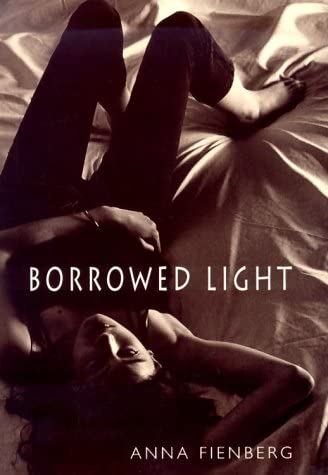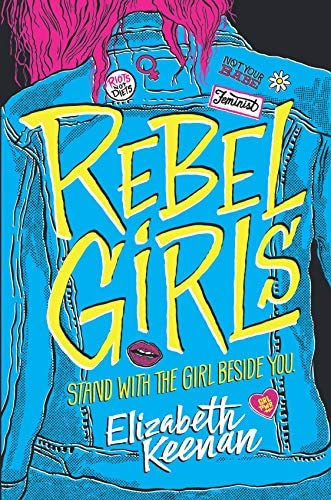My Reading Life: The Abortion Books, Part 3 (Novels)

I only read a couple novels on the topic of abortion, and both were from the young adult genre. I know there are probably hundreds of novels out there that deal with this topic, but this was never meant to be an exhaustive project — just a way to prioritize books already on my TBR around a theme. I have a lot of young adult books in my collection because I do a monthly recommendations column for girls ages 8-14, and publishers send me books for this age group (mostly unsolicited. Yes, I get free books without even asking. Please don’t hate me.) I also used to be a teen services librarian.
In both these roles, I’ve noticed a lot of books circulating about teen pregnancy, but not a ton about teen abortion. I’ve read three books that address teen abortion, all from a pro-choice perspective. I’ll only be reviewing two of them here, since the first one I read 14 years ago.
Rebel Girls by Elizabeth Keenan

“God, so what if you did?” Sara exclaimed suddenly. “It doesn’t matter! It’s none of their business! And it seems jerkish that anyone is talking about it at all, like, no matter what, they’re in the wrong. Isn’t Roe v. Wade about privacy, anyway?”
– Elizabeth Kennan, Rebel Girls
This was the first book I read for this project, when the shock and surreal quality of Roe v. Wade being overturned was still fresh. As such, what most struck me while reading was the general assumption that Roe v. Wade was a done deal, whether you agreed with it or not. Characters could debate the morality of abortion or the stigma surrounding it without its place as an established right ever being in question.
This book takes place in the early 1990s, so it’s historical fiction about, ironically, a time when women had more rights than they do now in this regard. It was published prior to the overturning of Roe v. Wade as well (September 2019). Athena is a pro-choice girl at a Catholic school whose younger sister Helen is staunchly pro-life. This causes Helen a lot of distress when a rumor begins circulating that she had an abortion over the summer.
Rebel Girls is more about the stigma surrounding abortion than abortion itself. It’s a pretty simplistic treatment of the topic and there aren’t a lot of surprises. It also feels as if it was written in a bit of an echo chamber — despite the fact that both pro-choice and pro-life characters populate the book, most of the pro-life characters are portrayed as manipulative, one-dimensional, misinformed, and, well, somewhat evil. While this “dark side” of the pro-life movement definitely exists, amping it up in this book means it’s not going to reach across the divide. Pro-life readers will feel alienated from the very arguments it’s trying to make. But maybe the author doesn’t intend to bridge the gap. Maybe she just wants to show how hard it is to maintain feminist ideals in a high school environment. In that regard she’s pretty successful, and I can imagine some burgeoning feminists feeling really “seen” by this. But for the most part, this book is populated with stock characters making stock arguments that even a sympathetic reader such as myself found a little tedious.
Borrowed Light by Anna Fienberg
“See, you’re not going to read this anymore now, are you? Well, are you? You won’t approve of me, I bet. You might say–well, what a creature, a sluttish girl with no moral backbone.”
– Anna Fienberg, Borrowed Light
The YA book about abortion I read 14 years ago, I Know It’s Over by C.K. Kelly Martin, lead me to this one. I Know It’s Over is about a teen boy coping with the end of his relationship with his girlfriend and her unplanned pregnancy. I emailed Ms. Martin complimenting her on her thoughtful, nuanced treatment of the topic of abortion. It was the first time I had ever come across it in a YA book, and I read a LOT of YA books. She wrote back and told me she had rarely encountered abortion in YA books, either, except for in an Australian book called Borrowed Light. Well, I think it’s obvious what happened next. I tracked the book down and, in typical Lacey fashion, let it languish on my bookshelf for a decade or so.
This is an incredibly interior treatment of the topic. Callisto, a teen girl who feels desperate to please others, becomes pregnant because she can’t bear to turn down the sexual advances of a boy who is interested in her. She lives within a suffocating environment of unspoken and unaddressed grief at home. Her parents’ relationship is toxic, and her mother struggles to be emotionally present for Callisto or her five-year-old brother. The entire first half of the book is devoted to Callisto mulling over her predicament; at the halfway point, she makes a decision and executes it on her own, one of the first times she feels as if she is doing something totally for herself.
Despite the very intimate nature of the storytelling in Borrowed Light, and despite the fact that it takes place in Australia and not the United States, it dovetails with a lot of my non-fiction reading. Callisto isn’t thinking about politics as she considers her decision, despite the fact that abortion had only recently begun to be decriminalized in Australia when the book was published (1999). And most real women seeking abortions are not thinking about politics, either, according to The Turnaway Study. Most of them are mired in their own personal circumstances and making choices for their future, just as Callisto was. A sizeable minority of women seeking abortions — about twenty percent — feel that abortion is morally wrong but that it should be legal.
This book briefly and poignantly addresses how the politicization of abortion interferes with girls and women being able to fully process their own experiences. After describing a politician who claims abortions skyrocket in the spring because women don’t want to look fat at the beach, Callisto observes,
“People like him make it so much harder. I mean, when they’re waving placards and spitting at you, you can’t admit a moment of weakness. You can’t tell about the feeling afterward, the sadness. You just say you’re fine.”
God, can I just say my heart is breaking right now typing that up? The conversation around abortion has become so toxic, and apparently not just in the U.S., that the lived experiences of real women are being silenced and suppressed. Yes, this was a work of fiction, but this “silencing” is explored more fully in May Cause Love by Kassi Underwood, a memoir that I’ll write about in a future post. And I still find just writing about this topic on my blog to be terrifying, feel the pressure to “choose a side” and adamantly defend it. But what if we spent less time defending our own viewpoint and really listening to those most affected by this? What if we took a step back from the political and returned to the personal? But unfortunately, the politics are robbing women of the ability to make decisions about their personal lives, to wrestle with their own morality, or to even voice an opinion on abortion that does not easily cleave to one camp or the other.
My apologies for the tangent, but this is a thoughtful and thought-provoking treatment of the topic of abortion for young adults. Callisto ultimately finds the abortion to be an empowering experience, as many of the women reported of their abortions in The Story of Jane. But there are more layers to it than that, for those who are patient enough and quiet enough to let them unfold.
Next up will be two posts about the five books I read in which brave women shared not just their opinions about abortion, but their personal stories. They are not stories I will easily forget.
(If you missed my introductory post or my review of the academic books I read, you’ll find them in the links above.)
